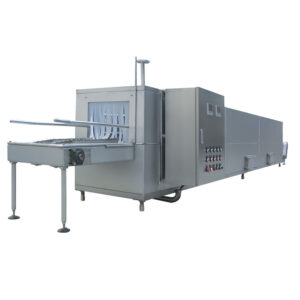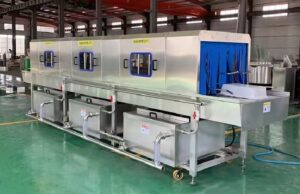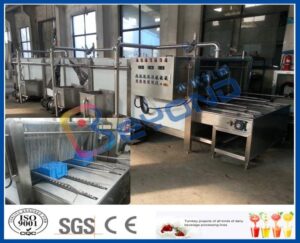Plastic crate washing machines and pasteurizing tunnels are essential for industries that prioritize hygiene and efficient cleaning. These machines help clean, sterilize, and maintain crates, containers, and other transport and storage mediums, especially in food processing, logistics, and agriculture. This article delves into their technical features, types, and functionalities, providing comparative tables for easier understanding.
Types of Plastic Crate Washing Machines
Plastic crate washing machines come in various designs tailored to meet specific industry needs. These machines cater to the cleaning requirements of food logistics centers, central kitchens, fast-food chains, and other facilities that handle perishable goods. Here, we compare the main types:
| Type | Applications | Capacity Range | Notable Features |
|---|---|---|---|
| Basic Crate Washer | Central kitchens, fast-food outlets, small factories | 300 – 800 crates/hour | Compact, automated, energy-efficient, economical |
| Industrial Crate Washer | Large food processing factories, logistics | 800 – 10,000 crates/hour | Customizable, high-capacity, HACCP compliant, automated temperature control |
| Specialized Crate Washer | Agriculture, export logistics | Variable | Multi-stage cleaning, eco-friendly water recycling, capable of spin drying |
1. Basic Plastic Crate Washing Machine
The basic plastic crate washing machine includes four primary cleaning stages: pre-washing, main washing, rinsing, and final washing. These stages ensure that crates are thoroughly cleaned before reuse, preventing cross-contamination and maintaining hygiene standards.
Main Features:
- Material: Made from 304 stainless steel for durability and easy maintenance.
- Water Recycling: Utilizes circulated water from initial stages to reduce water consumption.
- High-Pressure Cleaning: Equipped with a sanitary pump for efficient high-pressure cleaning.
- Safety Features: Power-off protection and temperature control for safe and consistent operation.
| Technical Specification | BYXXJI-3 | BYXXJI-6 | BYXXJI-8 |
|---|---|---|---|
| Capacity | 300 pcs/hr | 600 pcs/hr | 800 pcs/hr |
| Steam Consumption | 250 kg/hr | 400 kg/hr | 500 kg/hr |
| Cooling Water Consumption | 300 kg/hr | 450 kg/hr | 500 kg/hr |
| Electric Consumption | 9.1 kW | 17.2 kW | 18 kW |
| Dimensions (LxWxH) | 700x1250x1110 mm | 1350x1380x1200 mm | 1650x1380x1250 mm |
2. Industrial Crate Washing Machine
Designed for heavy-duty use, industrial crate washing machines can handle up to 10,000 crates per hour and are typically customizable to client specifications. These machines are made to clean crates of varying shapes, sizes, and materials.
Features:
- Customizable Options: Available with single or double doors, horizontal or vertical tracks.
- Energy Efficiency: Low energy and water consumption with responsible detergent dosing.
- Safety Compliance: HACCP-compliant, supporting central monitoring systems.
- Environmentally Friendly: Reduces water and detergent waste, with options for spin drying or traditional drying.
Pasteurizing and Cooling Tunnels
Pasteurizing and cooling tunnels play an essential role in sterilizing packaged foods and beverages. By using regulated heat and cooling methods, they help eliminate contaminants without compromising product quality. The tunnels are available in two types: continuously spraying and water bath type.
| Type | Application | Cooling Method | Primary Uses |
|---|---|---|---|
| Continuous Spray Tunnel | Beverages, dairy, acidic milk products, bottled drinks | Sprayed cold water | Pre-cooling and final cooling of beverages and juices |
| Water Bath Pasteurizing Tunnel | Jelly, bottled beverages (PE/PP bottles) | Immersion in water bath | Sterilizing and cooling packed jelly and bottled drinks |
1. Continuously Spraying Type Pasteurizing Tunnel
This type of tunnel uses a combination of warm and cold water sprays to pre-cool and cool down products efficiently. The spraying method allows precise control over temperature and holding time, making it suitable for products that require quick cooling.
Key Features:
- Automated Control: Allows for temperature and time adjustments.
- Water Recycling: Uses recycled warm water, making it eco-friendly and cost-effective.
- Applications: Ideal for cooling acidic milk, juice, beverages, and flavor-enhanced drinks.
2. Water Bath Type Pasteurizing Tunnel
The water bath type tunnel immerses products in a controlled temperature water bath to achieve pasteurization. With adjustable holding times, it provides thorough sterilization and cooling. This type is typically used for packed jelly and PE/PP bottle products, ensuring they meet safety and quality standards.
Specifications:
- Material: SUS304-2B stainless steel, ensuring durability and hygiene.
- Temperature Control: PLC or PID-based controls for precision.
- Applications: Primarily for PE/PP bottle products and jellies, with effective regulation of sterilization time through speed control.
Comparison Table: Crate Washing Machine vs. Pasteurizing and Cooling Tunnel
| Aspect | Crate Washing Machine | Pasteurizing and Cooling Tunnel |
|---|---|---|
| Purpose | Cleaning and disinfecting crates | Sterilizing and cooling food and beverage products |
| Main Application | Logistics, food processing | Beverage, dairy, food industry |
| Water Use | Recycled in certain stages | Recycled warm water in spray tunnel |
| Temperature Control | Independent temperature control per tank | Auto-regulated based on holding time and product |
| Material | Stainless steel (304 grade) | SUS304-2B stainless steel |
| Cleaning Efficiency | High-pressure, 360° spray cleaning | Full immersion or spraying for thorough coverage |
| Automation | Fully automated with safety protocols | Automated with adjustable temperature and holding time |
Importance of Automated Washing and Pasteurizing Systems
Both crate washing machines and pasteurizing tunnels significantly enhance productivity and safety in food-related industries. Their automated controls, combined with durable, hygienic materials, provide several advantages:
- Time and Labor Savings: Automated systems reduce manual cleaning requirements, freeing up labor resources and cutting down on processing time.
- Enhanced Hygiene: These machines ensure thorough cleaning and sterilization, crucial for maintaining food safety standards.
- Water and Energy Efficiency: By recycling water and utilizing precise heating methods, these systems reduce water and energy consumption, making them environmentally friendly.
- Compliance with Standards: Designed to meet HACCP and other regulatory requirements, these machines help industries maintain consistent quality and safety standards.
Conclusion
For businesses in the food and beverage industries, investing in automated plastic crate washing machines and pasteurizing tunnels ensures high standards of hygiene, efficiency, and regulatory compliance. By comparing the technical features and types, businesses can select the right equipment tailored to their specific production needs, achieving cleaner operations and safer products.





